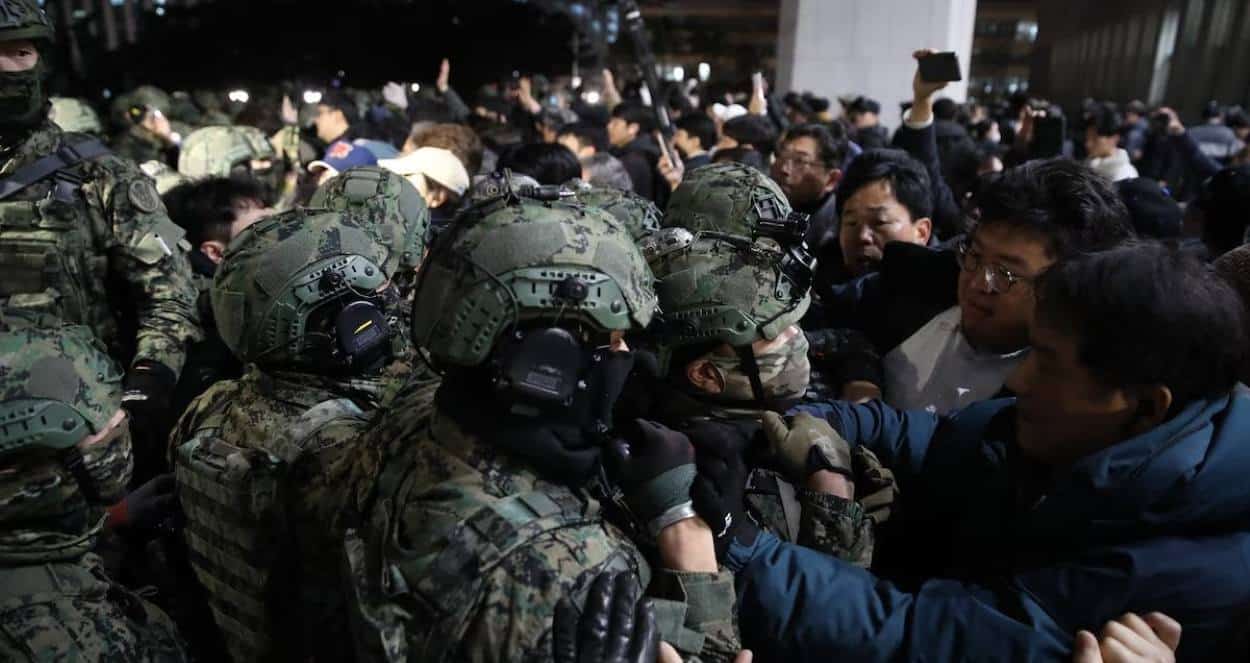South Korea has declared martial law for the first time since the early 1980s. The development has far-reaching implications for its citizens. To understand the full impact of this declaration, here’s a detailed breakdown of what martial law entails for South Korean residents.
- Total Prohibition on All Political Activities: All political activities would be halted indefinitely. This includes operations within the National Assembly and local councils, activities of political parties, and any form of rallies, protests, or demonstrations. Citizens would be forbidden from engaging in political associations or affiliations. This measure effectively suspends democratic processes and limits citizens’ ability to participate in governance or express political opinions.
- Complete Control of Media All media outlets—including print, radio, broadcast, internet, and social media platforms—would come under the strict oversight of the Martial Law Command. Freedom of the press would be significantly curtailed, with content likely subjected to censorship or approval by military authorities. Citizens might experience limited access to information, impacting their ability to stay informed about national and international events.
- Total Ban on Protests and Rallies Public gatherings such as strikes, protests, and rallies would be prohibited. This includes work stoppages and public speeches intended to rally support or opposition. Any actions leading to social unrest or inciting violence would be strictly forbidden. The ban aims to maintain public order but restricts citizens’ rights to assemble and express dissent.
- Punishment for Misinformation Dissemination of information that denies or attempts to overthrow the liberal democratic system would be illegal. This encompasses propaganda, manipulation of public opinion, misinformation, disinformation, and spreading fake news. Individuals found guilty of such actions could face legal penalties. Citizens need to exercise caution in their communications to avoid violating these laws.
- Mandatory Service for Medical Staff: All medical personnel, including doctors, nurses, medics, and trainees, whether active or retired, must report back to the medical field within 48 hours. They are expected to perform their duties faithfully and follow instructions from relevant authorities. Failure to comply could result in punishment under martial law provisions. This measure ensures that medical services remain operational during the period.
- Designation of Enemies of the State Individuals or groups identified as anti-state or subversive forces would be dealt with according to martial law regulations. This could involve arrest, detention, or other legal actions. The aim is to neutralize threats to national security, but it could also suppress political opposition.
- Impact on Ordinary Citizens While martial law would impose strict regulations, measures would be taken to minimize inconvenience in ordinary citizens’ daily lives. Despite this, increased military presence, checkpoints, and enforcement activities could disrupt normal routines.
- Arrest and Detention Without Warrant Authorities would have the power to arrest, detain, and search individuals without a warrant if they are suspected of violating martial law orders. This suspension of certain legal protections means citizens could be subject to legal action without the usual judicial oversight.
- Legal Penalties Under Article 14, Violations of martial law orders would be punishable under Article 14 of the Martial Law Act. Penalties could include fines, imprisonment, or other forms of punishment deemed appropriate by military courts.
Read: President Yoon Suk Yeol Declares Martial Law in South Korea
The imposition of martial law in South Korea would represent a profound shift in governance and civil liberties. Citizens would experience increased government control over many aspects of daily life, including political expression, media consumption, and personal freedoms. To navigate safely through such a period, individuals must stay informed through official channels and adhere to regulations.






